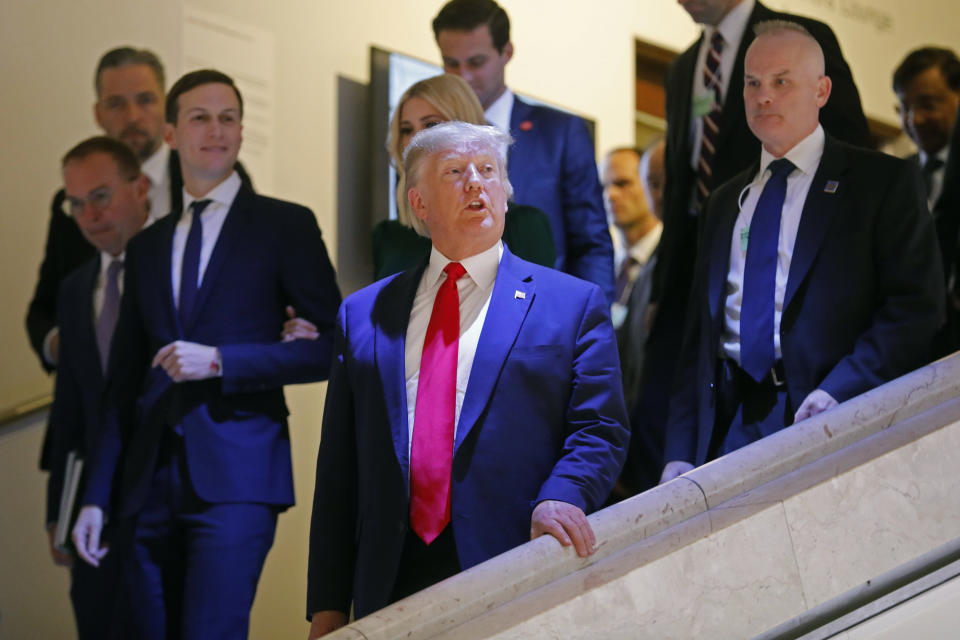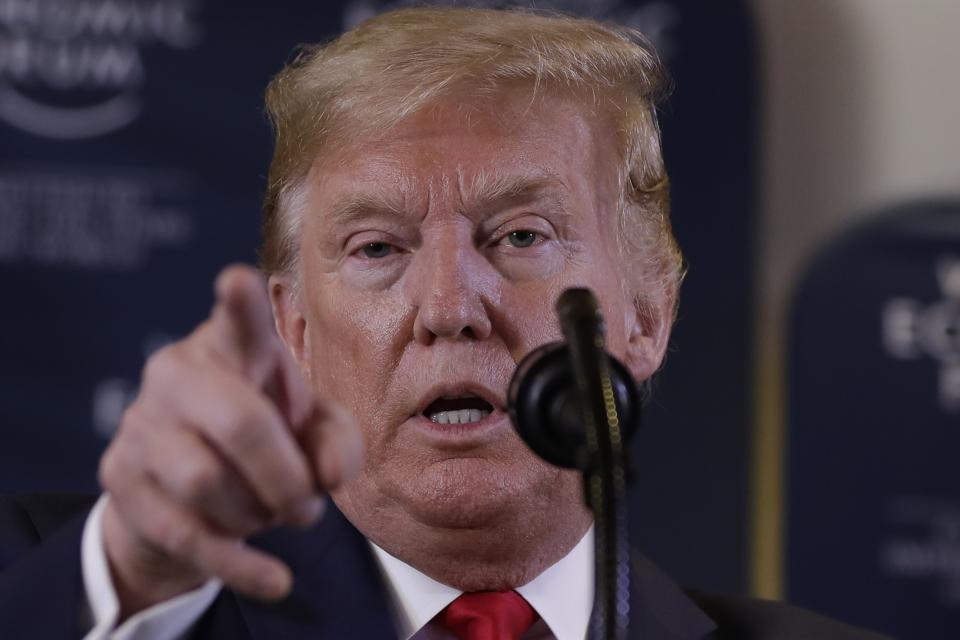US-French tax truce a respite in tense relations with EU
DAVOS, Switzerland (AP) — France will delay its tax on big tech firms like Google and Facebook in exchange for the United States's promise to hold off retaliatory tariffs — a potential sign of goodwill in the U.S. and European Union's increasingly tense relations over trade.
After U.S. President Donald Trump threatened the EU with bigger tariffs, French Finance Minister Bruno Le Maire said Wednesday he had negotiated a truce with U.S. Treasury chief Steven Mnuchin on the sidelines of the World Economic Forum in Davos, Switzerland.
Le Maire said France would delay collection of the digital tax until December, parking the issue until after the next U.S. presidential election where Trump hopes to secure another four-year term.
The 3% tax on the revenues of big internet companies only came into force last July and prompted outrage in the U.S., which launched retaliatory tariffs against French wine, cheese and other products.
The two countries eventually agreed a month later to try to create an international agreement on how to tax digital business by mid-2020, but neither side would back off their punitive taxes. They agreed to on Wednesday in Davos.
Le Maire, Mnuchin and the head of the Paris-based Organization or Economic Co-operation and Development, José Ángel Gurría, will meet Thursday to work on an international approach to taxes on digital companies.
“I absolutely expect we will come to a solution because there is no plan B," Gurría told The Associated Press earlier in Davos.
It remains unclear whether they can find an international agreement, as it would involve dozens of countries with often conflicting views.
Le Maire said France was not in a position to scrap its tax until such an international accord has been reached and insisted that companies reliant on internet business need to pay taxes wherever they are based and wherever they operate.
The French measure is an attempt to get around tax avoidance measures by multinationals, which pay most of their taxes in the EU country they are based in — often at very low rates. That effectively means the companies pay next to no tax in countries where they have large operations
“Digital companies will pay their fair tax in 2020,” Le Maire told reporters in Davos.
At face value, the deal appears to dial down the risk of a wider trade war between the U.S. and the EU, of which France is part of.
However, Trump and Mnuchin both took a noticeably tough line on the EU that stoked concerns that the months ahead could see a new escalation in trade tensions.
Trump, who last week reached an interim trade deal with China easing tensions between the world’s two biggest economies, ratcheted up his criticism of the EU and said its approach to trade was in fact worse than Beijing's.
“They have trade barriers where you can't trade,” he said at a press briefing at the conclusion of his two-day stay in Davos. “They have tariffs all over the place. They make it impossible. They are, frankly, more difficult to do business with than China.”
Trump said he wanted to get a first trade deal with China before taking on deeper negotiations with the EU.
Trump has used tariffs - or the threat of them - repeatedly to wrest trade concessions from U.S. trading partners including China, Mexico and Canada. In October, he slapped tariffs worth $7.5 billion on EU goods in October after prevailing in a case over airplane subsidies. He has also repeatedly raised the specter of tariffs on European cars.
The EU Commission's new president, Ursula von der Leyen, who met with Trump in Davos on Tuesday, said the two agreed to move quickly to resolve any trade disputes.
“I think that we have a lot in common and lot to work for,” she said. "There is a golden rule that we first of all negotiate with our American friends.”
Even erstwhile allies, such as Britain, could face retaliation from the U.S. if they push ahead with their own digital tax plans. Dozens of governments have enacted or are contemplating such taxes on big tech companies that operate in their countries.
Britain, which is scheduled to leave the EU on Jan. 31 and is keen to strike a trade deal with the U.S. as well as with its former partners in the bloc, has become caught up in the dispute.
Britain is due to impose a 2% levy on the digital business of firms making 500 million pounds ($640 million) a year in global revenues from April.
Britain's Treasury chief, Sajid Javid, sought to walk a fine line on the issue.
“We plan to go ahead with our digital services tax in April,” he said in Davos. “It is a proportionate tax and a tax that is deliberately planned as a temporary tax. It will fall away when there is an international agreement.”
Mnuchin told the same panel that the two men would have “some private conversations about that.”
“We’ve been pretty clear that we think the digital tax is discriminatory in nature,” Mnuchin said.
Alluding to plans by dozens of countries contemplating such taxes, he said: “If people want to just arbitrarily put taxes on our digital companies, we will consider arbitrarily putting taxes on their car companies.”
___
Masha Macpherson in Davos, Angela Charlton in Paris and Paul Wiseman in Washington contributed to this report.
___
For more stories on technology by the AP visit this page.




